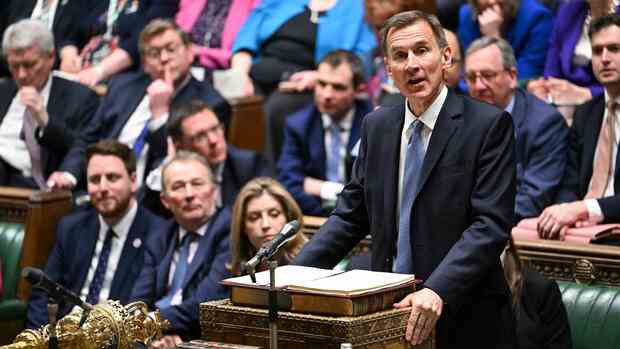London Budget Day is a major political event in Great Britain. The House of Commons is so packed that many MPs have to stand to hear Treasury Secretary Jeremy Hunt’s budget speech on Wednesday afternoon. Outside Parliament, teachers and young doctors are demonstrating for higher wages in the public sector. The mood is heated – inside and outside.
Great Britain has been paralyzed by mass strikes again and again for months. Wage development cannot keep up with the inflation rate of around ten percent recently. Added to this are the economic after-effects of Brexit. At the same time, the country suffers from a chronic weakness in productivity and growth.
Britain is the only country among the seven major industrialized nations (G7) that has not yet regained the economic prosperity it enjoyed before the pandemic. Hunt explained in writing to the Handelsblatt how he wants to catch up: “The British economy has proven to be more resilient than many expected in the face of severe global challenges,” emphasizes the Tory politician. The UK was the fastest growing economy in the G7 last year and the private sector has already recovered to pre-pandemic levels.
“I recognize, however,” continued the finance minister, “that our recovery is not over yet. Thanks to the measures I presented in the spring budget, we are now expected to avoid a recession, more than halve inflation this year and leverage is expected to come down from 2027/28.”
Hunt wants to address chronic stunted growth
Numerous finance ministers have already bitten their teeth at the chronic weakness in growth. Nevertheless, Hunt is confident that he can give the economy a boost: “With our budget plans, we want to eliminate two main obstacles to growth: the lack of employment on our labor market and corporate investment.” To this end, he announced important measures to do more getting people to work. He would like to give parents more support with childcare, and long-term sickness should be made easier to return to work.
In his speech, Hunt pointed out that around seven million able-bodied adults in the UK have opted out of the labor market.
Budget Day in the British Parliament. Many MPs had to stand on Wednesday to hear the Chancellor of the Exchequer’s speech.
(Photo: dpa)
However, there is a need for explanation, especially in the case of investment subsidies. Despite internal party criticism, the finance minister wants to increase the corporate tax rate for companies from 19 to 25 percent. The low tax rate has not sufficiently stimulated the investment activity of companies, he said in the House of Commons.
“In terms of corporate taxes, I have announced a cut of £9 billion a year, to be achieved through a new full write-off policy,” Hunt told Handelsblatt. This allows taxpayers to deduct 100 percent of the cost of certain equipment and machinery from their pre-tax profits. “That means the UK will have the most competitive depreciation regime in the OECD.”
Hunt, who voted in favor of Great Britain remaining in the EU in the 2016 Brexit referendum, is now one of those for whom the exit entails more opportunities than risks. He denies that Brexit has made the country poorer – although both the independent Office for Budget Responsibility (OBR) and British central bankers have predicted negative consequences for growth and investment. “I would like to point out that since 2010 the UK has grown faster than Japan, France and Italy and at about the same rate as Germany,” stresses the Tory politician. The British people voted for Brexit and “we are focused on seizing the opportunities that arise”.
At the same time, Hunt renewed his promise of a “Brexit dividend”: “We have already set our plans for the future of our financial services sector and have released investments of more than £100 billion for major infrastructure projects.” Accelerate healthcare products, “for example, by introducing the world’s fastest and easiest regulatory approval for companies looking to get to market quickly over the next two years.”
Deregulation should ensure growth
Hunt is not afraid of locational competition with the EU leading to reduced standards: “I know that the UK’s success in our leading sectors – including financial services and life sciences – is based on consistently high regulatory standards and openness. We don’t intend to change that,” emphasized the Chancellor of the Exchequer.
Instead, his reforms are primarily about “thinking boldly about how best to regulate”. This also applies to the technology sector. The science and technology framework focuses on ten key actions, from pursuing disruptive technologies like AI and supercomputing to attracting top talent.
More: London wants to combat the chronic weakness in growth with tax incentives
